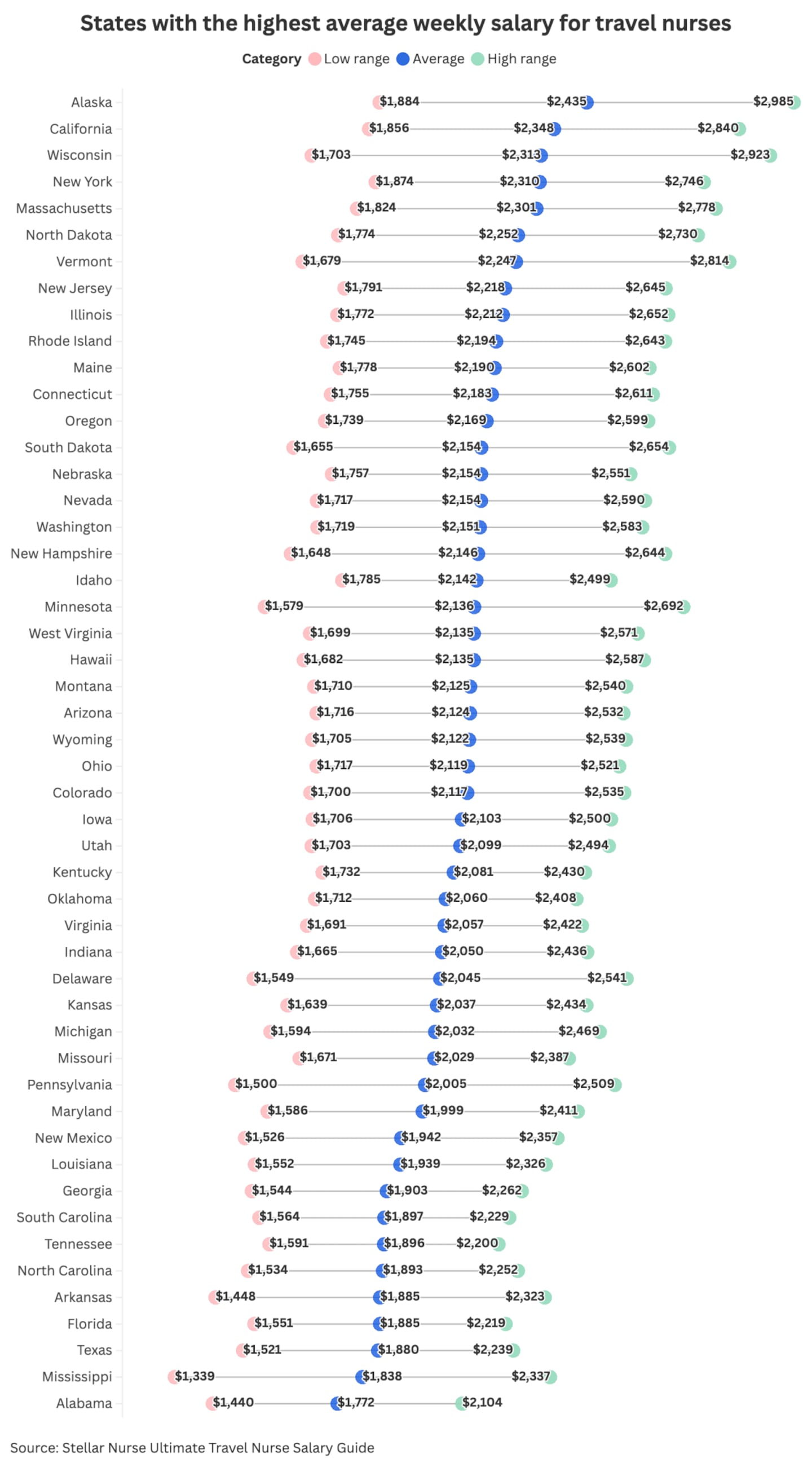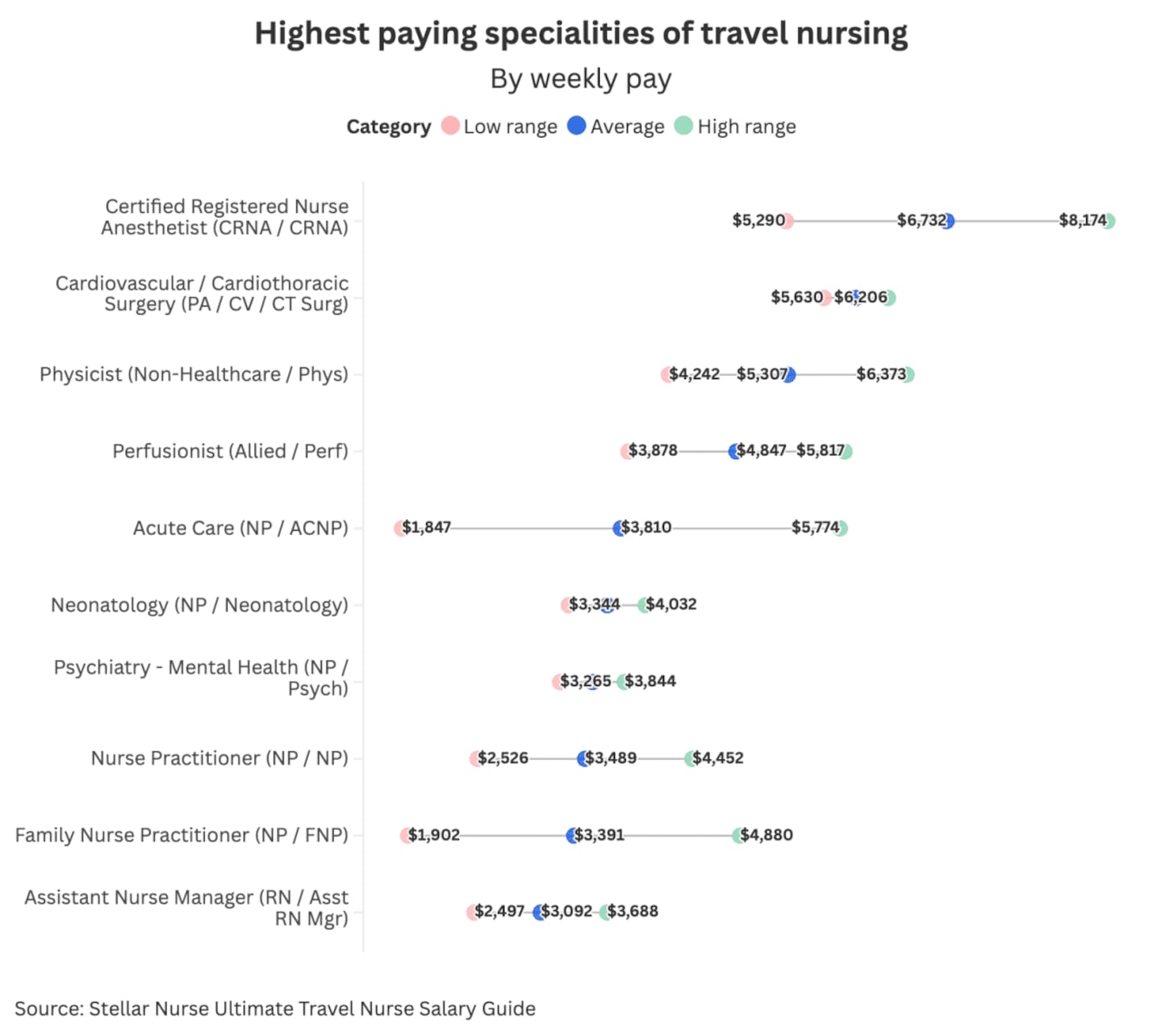Where travel nurses earn the most and least: Pay trends by state and specialty
Travel nursing took off during the COVID-19 pandemic and it has continued to grow. In 2020, Staffing Industry Analysts reported that travel nurse staffing demand jumped 35%.
What used to make up just 3%-4% of hospital nursing staff ballooned to 8%-10% by mid-2021. Hospitals leaned hard on travel nurses to keep care running, turning what was once a temporary fix into a core part of the system.
The idea isn't new, but it didn't go mainstream until more recently, when COVID pushed interest into high gear. In January 2019, travel nurses were working 4% of all hours worked by nurses in hospitals, according to Syntellis Performance Solutions data. By January 2022, that number reached 23%.
National Health Ratings looks at where travel nurses are earning the most — and the least — using data from the Stellar Nurse Ultimate Travel Nurse Salary Guide. This story will break down how pay varies by location, specialty, and demand in today's fast-changing healthcare world.
The travel nursing boom: From crisis response to career path
Before COVID: a niche solution
Travel nursing officially got its start in 1978 with TravCorps in New Orleans. From the beginning, it was all about filling staffing gaps — whether from regional shortages, seasonal surges, or new hospital programs. Travel nurses made up just a small part of the workforce. The jobs paid well and offered flexibility, but most nurses still saw them as temporary gigs, not full-time careers.
How the pandemic changed everything
In 2020, COVID-19 hit, and demand for travel nurses shot up. By August 2021, more than 30,000 travel nurse jobs were available, according to health care staffing firm SimpliFi. The pay, flexibility, and urgent need turned short-term contracts into a serious long-term option for many nurses.
Now: High demand, slower pace
The travel nursing market is cooling but still stronger than before the pandemic, according to Staffing Industry Analysts. After peaking at $42.7 billion in 2022, a 2025 report from TravelNurses says the U.S. industry is expected to stabilize around $19.5 billion by 2025, which is almost triple what it was pre-pandemic. Looking ahead, WiFiTalents projects the industry to grow steadily at 5.8% annually through 2028.
Where travel nurses earned the most and least
Travel nurse pay swings hard depending on where you go. According to the Stellar Nurse Ultimate Travel Nurse Salary Guide, Alaska leads the pack with an average weekly wage of $2,435. California isn’t far behind at $2,348, followed by Wisconsin ($2,313), New York ($2,310), and Massachusetts ($2,301). These high-paying states usually come with higher living costs, strong union presence, and big-city hospital demand.
At the lower end? Alabama averages just $1,772 per week, with Mississippi, Texas, Florida, and Arkansas all hovering around $1,880. While the cost of living in these states is lower, it rarely makes up for the smaller paychecks.
National Health Ratings
Regional trends are shifting, too. In Q1 2025, salaries ticked up 0.7% in the West but dropped 0.88% in the South, hinting at stronger demand and better funding along the coasts. Big cities typically pay more than rural areas.
Still, weekly pay isn’t the whole story. Real value comes from the full package; think housing stipends, tax-free benefits, and how far your money actually goes in a given city.
How specialization shapes travel nurse pay
Location matters — but what you specialize in can matter even more. Nurses working in high-stress, high-demand specialties consistently top the pay charts.
At the very top, Certified Registered Nurse Anesthetists (CRNAs) pull in about $6,732 per week, with some hitting $8,000 or more. Cardiovascular and cardiothoracic surgery physician assistants follow at $5,918, and even nonclinical roles like medical physicists average $5,307 a week.
Other strong earners include perfusionists ($4,847) and acute care nurse practitioners (ACNPs), who average around $3,810 per week. These jobs usually require advanced certifications and deep experience in critical care or surgical environments.
National Health Ratings
Experience boosts earnings, too. New travel nurses often make between $90,000 and $100,000 a year, while seasoned ICU nurses can clear $150,000, especially with credentials like Certified Critical Care Registered Nurse, Trauma Nursing Core Course, or Certified Pediatric Nurse under their belts.
Specialty training isn’t cheap, but the payoff can be huge. For nurses looking to maximize income, investing in high-acuity certifications is one of the smartest moves.
What nurses really earn: Beyond the base rate
Travel nurse pay isn’t just about the hourly wage. The full compensation package includes tax-free stipends, travel reimbursements, and long-term perks that can seriously boost take-home value.
Stipends and daily support
Housing stipends are one of the biggest draws. Nurses also get daily meal and incidental allowances based on federal General Services Administration per diem rates. On top of that, additional perks could include travel and relocation costs, from gas and airfare to licensing fees.
Tax perks that add up
Many of these stipends are nontaxable as long as nurses keep a qualifying tax home. That setup can lead to thousands in annual savings, especially compared to permanent staff roles with similar base pay.
Benefits that go the distance
Top agencies offer health insurance on day one, plus extras like 401(k) matching, continuing education funds, and certification support. Some even throw in bonuses for completing contracts or sticking with the same agency over time.
Add it all up, and travel nursing remains a strong financial option, even when base pay varies by state or specialty.
What it takes to become a travel nurse
Education and licensing basics
To start, you'll need to become a licensed registered nurse (RN). That means earning either an associate degree in nursing or a Bachelor of Science in Nursing — though many hospitals now prefer or require a BSN — and passing the National Council Licensure Examination for RNs.
To work across state lines more easily, many nurses get a multistate license through the Nurse Licensure Compact (NLC). Right now, 43 states fully participate, so nurses in those states can take assignments without reapplying for a license each time.
Experience requirements
Most agencies want at least one to two years of hands-on clinical experience. If you're aiming for specialties like ICU, ER, or OR, expect to need two or more years of post-orientation work. Inpatient experience is usually a must; hospitals tend to pass on candidates with only clinic or outpatient backgrounds for high-acuity roles.
Finding the right agency
Choosing the right staffing agency matters. Look for one that offers clear pay details, strong benefits, and solid recruiter support. A good recruiter will match you with the right jobs, walk you through contracts, and make sure you understand the full compensation package before you sign on.
The bottom line on travel nursing today
For nurses chasing flexibility and better pay, it’s still one of the most appealing career paths out there. From high-paying coastal gigs to growing demand in the Midwest, nurses can shape their assignments around income goals, lifestyle, and experience.
There's room to grow, too. Specializing in high-acuity areas or earning advanced certifications opens the door to top-tier contracts and better rates. When combined with smart agency partnerships, tax-savvy planning, and long-term goals, travel nursing becomes more than a short-term move; it becomes a viable, rewarding career.
Whether you’re just getting started or thinking about your next step, knowing where the money is — and how to make it work for you — helps you plan smarter for the road ahead.
This story was produced by National Health Ratings and reviewed and distributed by Stacker.












